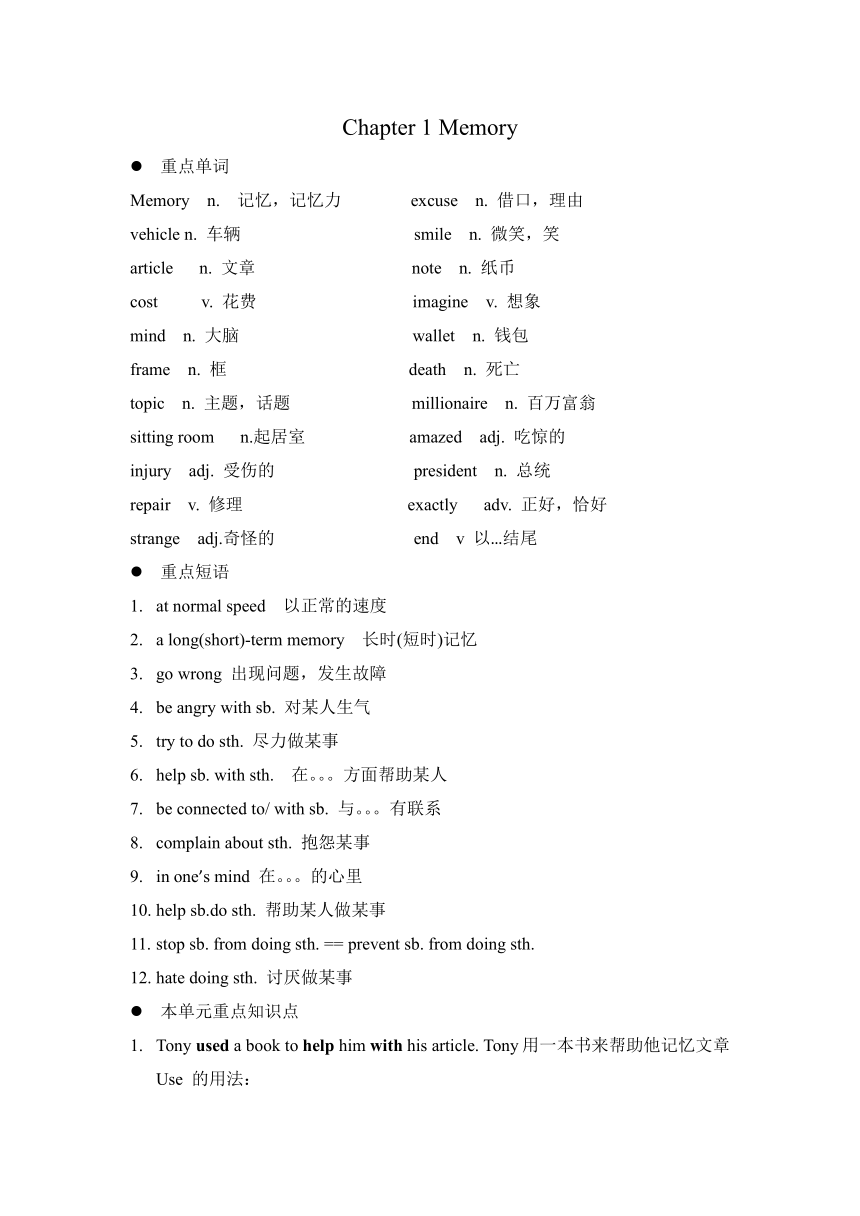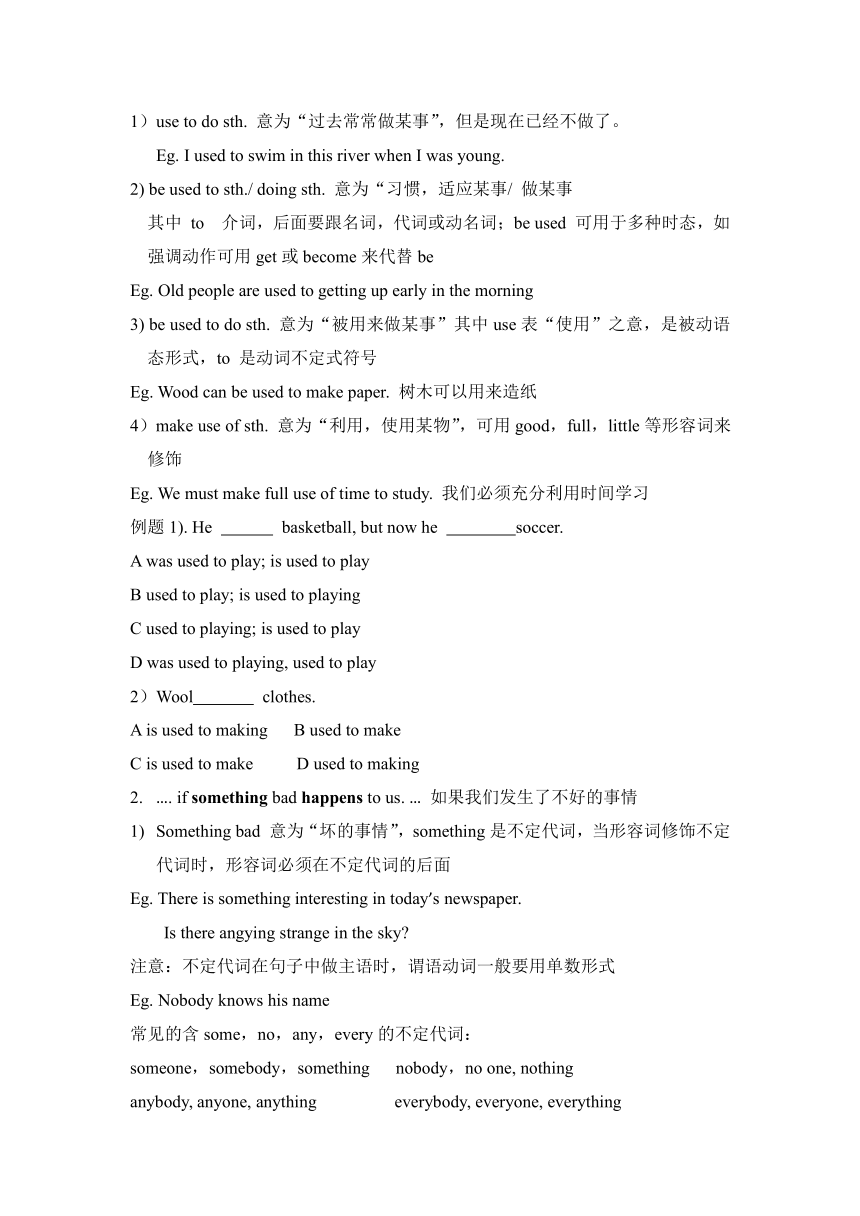unit1 Memory 知识点讲解
文档属性
| 名称 | unit1 Memory 知识点讲解 |  | |
| 格式 | zip | ||
| 文件大小 | 21.1KB | ||
| 资源类型 | 教案 | ||
| 版本资源 | 牛津深圳版 | ||
| 科目 | 英语 | ||
| 更新时间 | 2012-02-26 18:14:10 | ||
图片预览


文档简介
Chapter 1 Memory
重点单词
Memory n. 记忆,记忆力 excuse n. 借口,理由
vehicle n. 车辆 smile n. 微笑,笑
article n. 文章 note n. 纸币
cost v. 花费 imagine v. 想象
mind n. 大脑 wallet n. 钱包
frame n. 框 death n. 死亡
topic n. 主题,话题 millionaire n. 百万富翁
sitting room n.起居室 amazed adj. 吃惊的
injury adj. 受伤的 president n. 总统
repair v. 修理 exactly adv. 正好,恰好
strange adj.奇怪的 end v 以…结尾
重点短语
at normal speed 以正常的速度
a long(short)-term memory 长时(短时)记忆
go wrong 出现问题,发生故障
be angry with sb. 对某人生气
try to do sth. 尽力做某事
help sb. with sth. 在。。。方面帮助某人
be connected to/ with sb. 与。。。有联系
complain about sth. 抱怨某事
in one’s mind 在。。。的心里
help sb.do sth. 帮助某人做某事
stop sb. from doing sth. == prevent sb. from doing sth.
hate doing sth. 讨厌做某事
本单元重点知识点
Tony used a book to help him with his article. Tony用一本书来帮助他记忆文章
Use 的用法:
use to do sth. 意为“过去常常做某事”,但是现在已经不做了。
Eg. I used to swim in this river when I was young.
2) be used to sth./ doing sth. 意为“习惯,适应某事/ 做某事
其中 to 介词,后面要跟名词,代词或动名词;be used 可用于多种时态,如强调动作可用get或become来代替be
Eg. Old people are used to getting up early in the morning
3) be used to do sth. 意为“被用来做某事”其中use表“使用”之意,是被动语态形式,to 是动词不定式符号
Eg. Wood can be used to make paper. 树木可以用来造纸
4)make use of sth. 意为“利用,使用某物”,可用good,full,little等形容词来修饰
Eg. We must make full use of time to study. 我们必须充分利用时间学习
例题1). He basketball, but now he soccer.
A was used to play; is used to play
B used to play; is used to playing
C used to playing; is used to play
D was used to playing, used to play
Wool clothes.
A is used to making B used to make
C is used to make D used to making
…. if something bad happens to us. … 如果我们发生了不好的事情
Something bad 意为“坏的事情”,something是不定代词,当形容词修饰不定代词时,形容词必须在不定代词的后面
Eg. There is something interesting in today’s newspaper.
Is there angying strange in the sky
注意:不定代词在句子中做主语时,谓语动词一般要用单数形式
Eg. Nobody knows his name
常见的含some,no,any,every的不定代词:
someone,somebody,something nobody,no one, nothing
anybody, anyone, anything everybody, everyone, everything
happen 的用法
表示某地(某时)发生了什么事,常用“sth. + happen+ 地点/ 时间”这以结构来表达,此时主语是事情
Eg. An accident happened in that street. 那条街发生了一起事故
表示“某人出了某事(常指不好的事),要用” sth. + happen + to sb” 这一结构来表达
Eg. A car accident happened to her this morning. 今天上午她发生了交通事故
C.表示“某人碰巧做某事”,要用“sb. + happen to do sth.” 这一结构来表达
Eg. I happened to meet a friend of mine in the street yesterday.
例题
Have you got to eat
A something delicious B anything delicious
C delicious something D delicious anything
Nothing too difficult for you in the world if you put your heart into it.
A are B is C be D were
翻译:昨天我碰巧遇到我的老板
This makes it the longest word in the world! 这组成了世界上最长的单词
make 的用法:
做使役动词,后加形容词 eg. He told us a funny story and made us happy
做实义动词,make sb. do sth. 使某人做某事
注意:make sb. do sth. 表示被动的时候,要还原to. 即:be made to do sth.
Eg. The little girl is made to cry by his brother.
例题:1. He always makes his classmates .
A to laugh B laugh C laughing D laughs
2. Students in some schools are made for more than 12 hours a day.
A study B studying C to study D studied
cost v. 花费
辨析:spend,pay,cost与take
spend的主语是人,用来表示花金钱/时间/精力/干什么/在什么方面
sb. + spend… +on sth./ (in) doing sth.
Eg. I spend 2 hours practicing speaking English everyday.
2) pay 的主语是人,sb. pay+…for sth.
Eg. You haven’t paid the money for the books.
3) take 一般用物做主语或者用it做形式主语
Eg. It will take us at least one year to complete the bridge.
4) cost 的主语是物或某种活动,还可以表示“值”
sth. Cost sb. + 金钱
Eg. A new computer costs me a lot of money.
注意区别:afford 付得起,买得起,常与can’t或can连用
例题:1)it will several years to learn a foreign language well.
A cost B take C spend D use
2) How much did the new skirt you
A cost B take C spend D pay
3) – What about going to the concert this weekend
-- Sounds great, but the ticket is too expensive, I can’t it.
A spend B cost C pay D afford
5. either … or…. 或者….或者….,不是….就是….
Eg. Either come in or go out.
拓展:和either….or…一样在连接主语时谓语动词形式要依据就近原则的短语还有:neither…nor….既不…也不…,not only…but also…不仅…而且…
Eg. Neither I nor she speaks French. 我不会讲法语,她也不会。
Not only you but also I am hungry. 不只你,我也饿了
6. … you’ll find out its meaning, … 你会查明它的意思
辨析: find,find out与look for
A. find 找到,发现,后面直接加宾语或从句,强调结果
B. look for 寻找,常用于现在进行时,强调过程
例题:I am my watch. Can you it
A looking for, find B finding, find C looking, find D finding, look
重点单词
Memory n. 记忆,记忆力 excuse n. 借口,理由
vehicle n. 车辆 smile n. 微笑,笑
article n. 文章 note n. 纸币
cost v. 花费 imagine v. 想象
mind n. 大脑 wallet n. 钱包
frame n. 框 death n. 死亡
topic n. 主题,话题 millionaire n. 百万富翁
sitting room n.起居室 amazed adj. 吃惊的
injury adj. 受伤的 president n. 总统
repair v. 修理 exactly adv. 正好,恰好
strange adj.奇怪的 end v 以…结尾
重点短语
at normal speed 以正常的速度
a long(short)-term memory 长时(短时)记忆
go wrong 出现问题,发生故障
be angry with sb. 对某人生气
try to do sth. 尽力做某事
help sb. with sth. 在。。。方面帮助某人
be connected to/ with sb. 与。。。有联系
complain about sth. 抱怨某事
in one’s mind 在。。。的心里
help sb.do sth. 帮助某人做某事
stop sb. from doing sth. == prevent sb. from doing sth.
hate doing sth. 讨厌做某事
本单元重点知识点
Tony used a book to help him with his article. Tony用一本书来帮助他记忆文章
Use 的用法:
use to do sth. 意为“过去常常做某事”,但是现在已经不做了。
Eg. I used to swim in this river when I was young.
2) be used to sth./ doing sth. 意为“习惯,适应某事/ 做某事
其中 to 介词,后面要跟名词,代词或动名词;be used 可用于多种时态,如强调动作可用get或become来代替be
Eg. Old people are used to getting up early in the morning
3) be used to do sth. 意为“被用来做某事”其中use表“使用”之意,是被动语态形式,to 是动词不定式符号
Eg. Wood can be used to make paper. 树木可以用来造纸
4)make use of sth. 意为“利用,使用某物”,可用good,full,little等形容词来修饰
Eg. We must make full use of time to study. 我们必须充分利用时间学习
例题1). He basketball, but now he soccer.
A was used to play; is used to play
B used to play; is used to playing
C used to playing; is used to play
D was used to playing, used to play
Wool clothes.
A is used to making B used to make
C is used to make D used to making
…. if something bad happens to us. … 如果我们发生了不好的事情
Something bad 意为“坏的事情”,something是不定代词,当形容词修饰不定代词时,形容词必须在不定代词的后面
Eg. There is something interesting in today’s newspaper.
Is there angying strange in the sky
注意:不定代词在句子中做主语时,谓语动词一般要用单数形式
Eg. Nobody knows his name
常见的含some,no,any,every的不定代词:
someone,somebody,something nobody,no one, nothing
anybody, anyone, anything everybody, everyone, everything
happen 的用法
表示某地(某时)发生了什么事,常用“sth. + happen+ 地点/ 时间”这以结构来表达,此时主语是事情
Eg. An accident happened in that street. 那条街发生了一起事故
表示“某人出了某事(常指不好的事),要用” sth. + happen + to sb” 这一结构来表达
Eg. A car accident happened to her this morning. 今天上午她发生了交通事故
C.表示“某人碰巧做某事”,要用“sb. + happen to do sth.” 这一结构来表达
Eg. I happened to meet a friend of mine in the street yesterday.
例题
Have you got to eat
A something delicious B anything delicious
C delicious something D delicious anything
Nothing too difficult for you in the world if you put your heart into it.
A are B is C be D were
翻译:昨天我碰巧遇到我的老板
This makes it the longest word in the world! 这组成了世界上最长的单词
make 的用法:
做使役动词,后加形容词 eg. He told us a funny story and made us happy
做实义动词,make sb. do sth. 使某人做某事
注意:make sb. do sth. 表示被动的时候,要还原to. 即:be made to do sth.
Eg. The little girl is made to cry by his brother.
例题:1. He always makes his classmates .
A to laugh B laugh C laughing D laughs
2. Students in some schools are made for more than 12 hours a day.
A study B studying C to study D studied
cost v. 花费
辨析:spend,pay,cost与take
spend的主语是人,用来表示花金钱/时间/精力/干什么/在什么方面
sb. + spend… +on sth./ (in) doing sth.
Eg. I spend 2 hours practicing speaking English everyday.
2) pay 的主语是人,sb. pay+…for sth.
Eg. You haven’t paid the money for the books.
3) take 一般用物做主语或者用it做形式主语
Eg. It will take us at least one year to complete the bridge.
4) cost 的主语是物或某种活动,还可以表示“值”
sth. Cost sb. + 金钱
Eg. A new computer costs me a lot of money.
注意区别:afford 付得起,买得起,常与can’t或can连用
例题:1)it will several years to learn a foreign language well.
A cost B take C spend D use
2) How much did the new skirt you
A cost B take C spend D pay
3) – What about going to the concert this weekend
-- Sounds great, but the ticket is too expensive, I can’t it.
A spend B cost C pay D afford
5. either … or…. 或者….或者….,不是….就是….
Eg. Either come in or go out.
拓展:和either….or…一样在连接主语时谓语动词形式要依据就近原则的短语还有:neither…nor….既不…也不…,not only…but also…不仅…而且…
Eg. Neither I nor she speaks French. 我不会讲法语,她也不会。
Not only you but also I am hungry. 不只你,我也饿了
6. … you’ll find out its meaning, … 你会查明它的意思
辨析: find,find out与look for
A. find 找到,发现,后面直接加宾语或从句,强调结果
B. look for 寻找,常用于现在进行时,强调过程
例题:I am my watch. Can you it
A looking for, find B finding, find C looking, find D finding, look
同课章节目录
